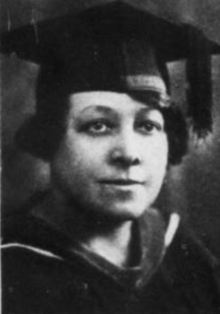Mae C. Hawes
Mae C. Hawes | |
|---|---|
 Mae C. Hawes, from a 1926 publication | |
| Born | September 7, 1886 Macon, Georgia |
| Died | February 1979 Woodbury, New York |
| Occupation | Educator |
| Relatives | Charles DeWitt Watts (nephew) |
Mae C. Hawes (September 7, 1886 – February 1979) was an American educator and social worker, focused on adult literacy. She held positions on the faculties of several historically Black colleges, including Atlanta University, Bethune-Cookman College, Tennessee State University, and Cheyney State College.
Early life and education[edit]
Hawes was born in Macon, Georgia, one of the fourteen children of Hampton B. Hawes and Janie Glover Hawes.[1] Surgeon and activist Charles Dewitt Watts was one of her nephews.[2]
Hawes earned a bachelor's degree at Atlanta University, and a master's degree in library science at Columbia University in 1926.[3] While there, she lived at the International House of New York.[4] She pursued further studies at the University of Chicago and the International People's College in Denmark. She was a member of Alpha Kappa Alpha sorority.[5]
Career[edit]
After graduate school, Hawes was the first superintendent of the Emma Ransom House, a dormitory of the Harlem YMCA.[6][7] She was also active in the national YWCA,[8] and headed the thrift department of Dunbar National Bank.[9] She worked with Alain LeRoy Locke on literacy projects in Harlem and Atlanta during the 1930s.[10][11] In 1937, she became head worker of the Southeast Settlement House in Washington, D.C.[5]
For most of her career, she was an adult educator and college faculty member.[2] She worked at Auburn University[12] and taught at Bethune-Cookman College,[13] the Atlanta University School of Social Work,[14] and Tennessee State University.[15] She was dean of women at Cheyney State College in Pennsylvania.[16][17] In the 1950s, she was director of Stephens House at the University of Southern California.[18]
In 1955, Hawes attended the World Assembly for Moral Re-Armament meeting in Washington. D.C.[18] She was a member of the Women's International League for Peace and Freedom, the National Association of College Women, and the Washington Federation of Churches.[5]
In 1968, Hawes was profiled in Ebony magazine as the "oldest VISTA volunteer", because she was still doing adult literacy work at age 81, while living at the Henry Street Settlement in New York City. "I've worked all my life and I guess I can't stop," she explained.[19] Her congressman, Joseph Y. Resnick, was so taken with the article that he read its text into the Congressional Record.[20]
Personal life[edit]
Hawes was an adherent of the Baháʼí Faith.[3] She died in 1979, aged 92 years, in Woodbury, New York.
References[edit]
- ^ "Hamp Hawes, Widely Known Georgian, Dies At Age Of 92". Chicago Defender. August 22, 1936. p. 4 – via ProQuest.
- ^ a b Merriweather, Lisa R. "Waking up the World: Mae C. Hawes and Adult Education" in Susan Imel and Gretchen T. Bersch, eds., No Small Lives: Handbook of North American Early Women Adult Educators, 1925-1950 (IAP 2014): 133-139.
- ^ a b Ruhe-Schoen, Janet (2020-10-23). "The Ride: Black and White Unity in the Jim Crow South". Bahai Teachings. Retrieved 2022-02-07.
- ^ "From the I-House Archives: Mae C. Hawes, Educator". International House. February 2020. Retrieved 2022-02-07.
- ^ a b c "Settlement Head Successful through Fondness for People". Washington Evening Star. July 24, 1938. p. 68. Retrieved February 6, 2022 – via NewspaperArchive.com.
- ^ "Y.M.C.A. Dormitory". The Southern Workman. 55: 528. November 1926.
- ^ "First year's operation of Emma Ransom House YWCA Hotel, connected with 137th Street Branch, shows fine results (continued…)". The New York Age. 1927-02-12. p. 2. Retrieved 2022-02-07 – via Newspapers.com.
- ^ Negro Yearbook. Negro Year Book Publishing Company. 1922. p. 225.
- ^ "Mae Hawes Resigns from Position at Dunbar National Bank". The New York Age. 1929-09-14. p. 3. Retrieved 2022-02-07 – via Newspapers.com.
- ^ Guy, Talmadge C. (August 1996). "Alain Locke and the AAAE Movement: Cultural Pluralism and Negro Adult Education". Adult Education Quarterly. 46 (4): 209–223. doi:10.1177/074171369604600403. ISSN 0741-7136. S2CID 145111171.
- ^ "New Move for Education of Older People; Miss Mae Hawes Will Direct Work". Chicago Defender. November 7, 1931. p. 4 – via ProQuest.
- ^ McPheeters, Annie L. (1988). Library Service in Black and White: Some Personal Recollections, 1921-1980. Scarecrow Press. pp. 34, 36, 95. ISBN 978-0-8108-2104-0.
- ^ "Faculty" The B-Cean (Bethune-Cookman College 1948 yearbook).
- ^ "Successful Social Worker". The Weekly Review. 1941-03-07. p. 3. Retrieved 2022-02-07 – via Newspapers.com.
- ^ "Negroes Here Lose Friend". Chattanooga Daily Times. 1912-04-30. p. 5. Retrieved 2022-02-07 – via Newspapers.com.
- ^ Bersch, Gretchen T. and Imel, Susan (2011). "Who Were the Women? An In-depth Analysis of Some Additional Early Women Adult Educators" Adult Education Research Conference.
- ^ "Cheyney Reports Largest Enrollment". Delaware County Daily Times. 1949-09-19. p. 8. Retrieved 2022-02-07 – via Newspapers.com.
- ^ a b "500 Re-armament Delegates to Bring Global Tinge in D.C." The Pittsburgh Courier. 1955-01-15. p. 15. Retrieved 2022-02-07 – via Newspapers.com.
- ^ "Still Hard at Work at 81". Ebony: 64–67. February 1968.
- ^ Congress, United States (1968). Congressional Record: Proceedings and Debates of the ... Congress. U.S. Government Printing Office. p. 3900.
External links[edit]
- Letter from Mae C. Hawes to W. E. B. Du Bois (February 20, 1918), W. E. B. Du Bois papers, in the Digital Commonwealth
- Letter from W. E. B. Du Bois to Mae C. Hawes (June 22, 1933), W. E. B. Du Bois papers, at Credo
